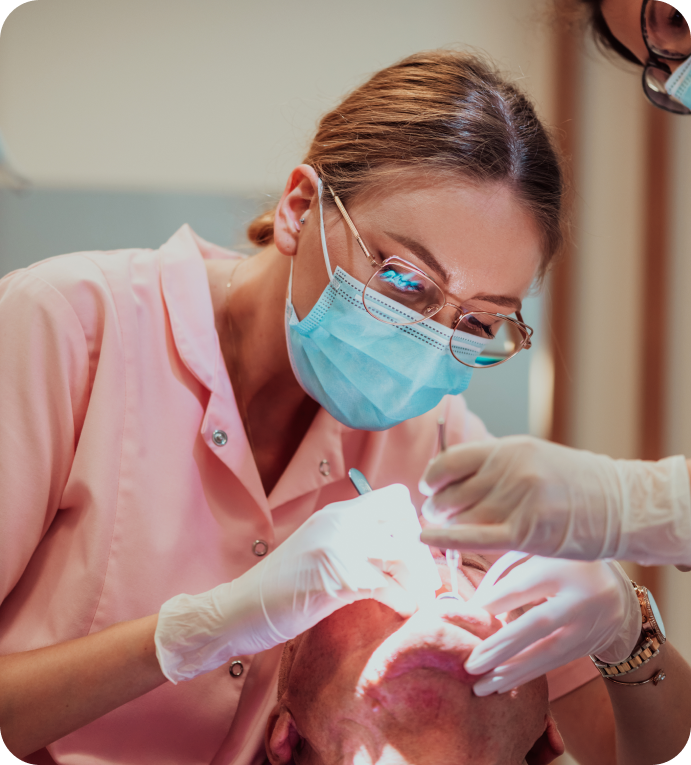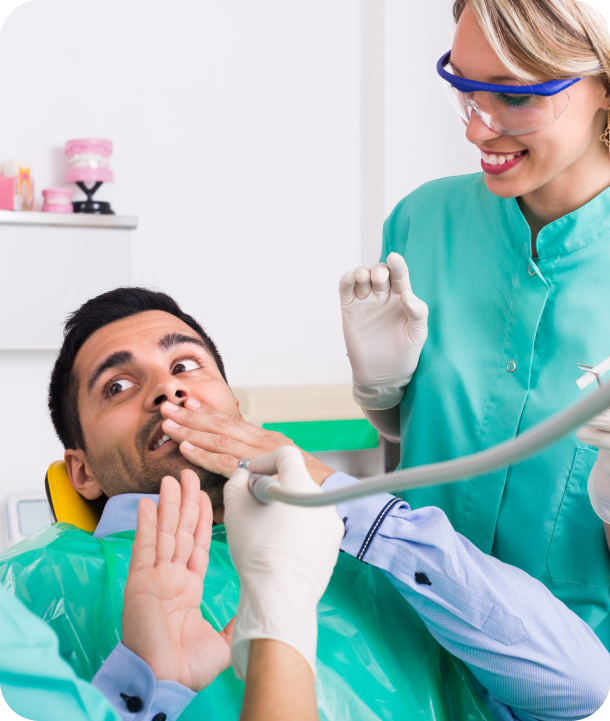Chipped or Broken Teeth Kelmscott
Effectively treat chipped or broken teeth with quality dental care and advanced treatments at Infinite Smiles Dental Clinic Kelmscott. Our experienced team is committed to restoring your smile and oral health.
Our Payment Options

Revealing the Damage: Understanding Chipped and Broken Teeth
Chipped or broken teeth can lead to pain, discomfort, and impact your smile. Don’t let these issues stop you from enjoying confidence and strong oral health.
At Infinite Smiles Dental Clinic Kelmscott, our skilled team specialises in transformative treatments for chipped or broken teeth. With extensive experience and a commitment to quality care, we’re here to restore your smile. Book an appointment today and take the first step toward renewed confidence and improved oral health.
Level Up Your Smile with Kelmscott's Trusted Dental Clinic
Take charge of your dental health. Book an appointment today at Infinite Smiles Dental Kelmscott and experience compassionate and personalised dental care that you can trust.
Book an Appointment
Breaking the Silence: Spotting the Key Symptoms of Chipped or Broken Teeth

Infinite Smiles Dental Clinic Kelmscott provides a variety of advanced dental services to treat chipped or broken teeth effectively:
- Sharp or jagged edges on a tooth
- Tooth pain or sensitivity when biting or chewing
- Visible cracks or chips on the tooth surface
- Discomfort or irritation to the tongue or soft tissues in the mouth
Restoring Your Confidence: Advanced Dental Solutions for Chipped or Broken Teeth
Infinite Smiles Dental Clinic Kelmscott offers a wide range of transformative dental treatments to restore chipped or broken teeth:

Frequently Asked Questions
About Chipped or Broken Teeth
If you have concerns about chipped or broken teeth, we’re here to help. Here are some frequently asked questions:
Chipped or broken teeth can result from various factors, including:
- Accidents or Trauma:
Direct impacts to the mouth, such as falls, sports injuries, or vehicle accidents, can cause teeth to chip or break. - Biting on Hard Objects:
Habitually biting or chewing on hard objects like ice, pens, or candies can weaken tooth structure over time, making them more susceptible to chipping or breaking. - Tooth Decay:
Tooth decay weakens the tooth’s structure, making it more prone to chipping or breaking, especially if not addressed. - Poor Oral Hygiene:
Inadequate oral hygiene practices, including infrequent brushing and flossing, can lead to tooth decay and weaken the enamel, increasing the risk of chipping or breaking teeth. - Teeth Grinding (Bruxism):
Frequent teeth grinding or clenching, often during sleep, can exert excessive force on the teeth, potentially causing them to chip or break. - Dental Fillings or Restorations:
Large or old dental fillings that weaken the tooth structure or faulty dental restorations can contribute to tooth chipping or breaking. - Age and Wear:
Over time, teeth naturally become more susceptible to chipping or breaking due to wear and tear, especially if there is pre-existing dental damage or weakened enamel.
It’s important to note that while accidents and trauma are common causes, other factors, such as tooth decay and bruxism, can also contribute to the risk of chipped or broken teeth. Practising good oral hygiene, wearing mouthguards during activities with a higher risk of dental trauma, and addressing dental issues promptly can help reduce the chances of experiencing chipped or broken teeth. Regular dental check-ups are also important for the early detection and appropriate treatment of any dental concerns.
If you chip or break a tooth, taking immediate action is important. Start by rinsing your mouth with warm water to clean the area around the broken or chipped tooth. If there is bleeding, apply gentle pressure with a clean piece of gauze or a damp tea bag to control it. Reduce swelling by applying a cold compress or ice pack wrapped in a cloth to the outside of your mouth near the affected area. Over-the-counter pain relievers can help manage any discomfort.
It is crucial to contact your dentist promptly to schedule an appointment. Even if you’re not experiencing severe pain, your dentist will assess the damage and recommend appropriate treatment options, such as dental bonding, veneers, or crowns, to restore the tooth’s function and appearance. Remember to avoid chewing on the affected tooth and stick to softer foods until you receive professional dental care.
Yes, a chipped or broken tooth can lead to an infection if the inner layers of the tooth, such as the pulp, are exposed. It is essential to seek prompt dental care to assess the extent of the damage and prevent complications.
Eating with a chipped or broken tooth can be challenging, depending on the severity of the damage. It is recommended to avoid chewing on the affected tooth and stick to softer foods that are easier to consume. Your dentist can provide specific dietary recommendations based on your situation.
Practising good oral hygiene, including regular brushing and flossing, is important to prevent chipping or breaking your teeth. Avoid biting down on hard objects, such as ice or popcorn kernels. If you engage in activities that pose a higher risk of dental trauma, such as contact sports, consider wearing a mouthguard for protection.
Transform Your Smile with Infinite Smiles Dental Kelmscott
Discover personalised dental care designed to enhance your smile at Infinite Smiles Dental Kelmscott. Book an appointment now!